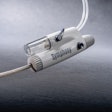Surgical devices firm C.R. Bard has received an investigational device exemption from the Food and Drug Administration and has begun a clinical trial to examine its new ePTFE-encapsulated self-expanding stent.
Developed and manufactured at Bard's IMPRA subsidiary in Tempe, AZ, the device is intended for use in the treatment of venous anastomotic stenosis. The first in a planned family of ePTFE-covered stents, the device will be evaluated as an alternative to balloon angioplasty or surgical revision in these patients, according to the Murray Hill NJ-based firm.
Bard believes that the placement of a covered stent across the venous anastomotic site in patients with significant stenosis may help to prolong the patency of these grafts and avoid painful and often expensive surgical revisions. The device comprises a nitinol framework totally encapsulated in ePTFE, complete with a carbon luminal lining, and is similar to the IMPRA Carboflo line of vascular grafts. The delivery system used to deploy the device is a flexible 9 Fr. retracting sheath system, according to Bard.
By AuntMinnie.com staff writersMarch 8, 2001
Related Reading
Bard gets clearance for Luminexx, March 6, 2001
Copyright © 2001 AuntMinnie.com



















